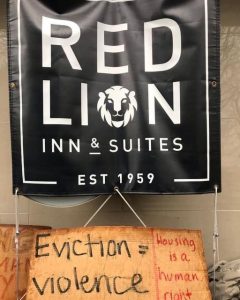No room in the end
Early in February, some of the wet, cold people living outside in Olympia tried to take rooms in the downtown Red Lion, aided and encouraged by activists from Oly Housing Now. Staff members of the hotel fled to the basement and called the police.
In contrast to what happened in the US Capitol on January 6, the police arrived immediately, bringing their “Special Weapons and Tactics” Team (that’s the SWAT team) and maybe other police contingents. There was no friendly reception like the one initially accorded the Capitol attackers, nor anything like the friendly assistance those attackers were accorded on departing. Instead members of the Olympia group were rapidly arrested and charged.
The following day, Olympia Mayor Selby denounced the participants as “domestic terrorists” (a label she earlier applied to people who graffitied her home).
“This created an active crime scene that necessitated a police response appropriate to the scale of the actions of these terrorists,” she said, in a statement covered in Fox News.
Oly Housing Now was employing a tactic that has emerged as the pandemic cuts deeper and deeper into the lives of people, forcing more and more people into the street. In order to impress public officials with the urgent need for housing, the approach is to pay for rooms for one night and then indicate their intention to stay.
In Austin Texas, this tactic wasn’t needed. The Austin City Council voted to buy a hotel that will serve as permanent housing for dozens of chronically unhoused people, using money taken from the city’s police budget to provide resources for the people who will live in the hotel. The council in August had voted to cut some $100 million from the police department’s budget. A recurring $6.5 million payment from those cuts is being set aside to fund permanent supportive housing.
In Olympia, Oly Housing Now released this list of demands that address the need for immediate shelter to prevent the spread of illness and repeated dislocations faced by people currently without the protections offered by indoor living:
The city of Olympia must stop the sweeps and provide the encampments with resources to meet the COVID-19 Centers for Disease Control and Prevention hygiene recommendations, including overflow sites, isolation sites, protective housing, sanitation services, hygiene materials and 24-hour restroom facilities.
The city of Olympia must use public first responder/public safety emergency housing in the form of hotel vouchers to support the houseless community in Olympia.
The city of Olympia must increase impact fees on luxury and commercial properties in Olympia’s downtown.
Thurston County and the city of Olympia must incentivize housing construction for people who meet the extremely low-income limit ($26,200 for a family of four).
Olympia residents pay additional sales tax to support a Homeless Fund that, in a year of high consumption, can bring in up to $2 million. Right now, funds are being used for two apartment complexes for people currently experiencing homelessness that hope to break ground in 2020 and 2021 with a mix of public resources from the City, County, State and other sources. There is no indication as to when these projects might be ready to house people.
The City also has a program that helps to provide “market-rate” housing. Currently benefiting from the program are four owners of nine high-end apartment buildings downtown. They are excused from paying about $10,012,000 in property taxes over 8 years. The savings either bumps up the developer’s bottom line, or serves to lower the rent a well-heeled tenant might otherwise pay.
Mary Jo Dolis is a long-time resident of Olympia. She lived in 12 different rental houses by the time she graduated from high school.

Be First to Comment